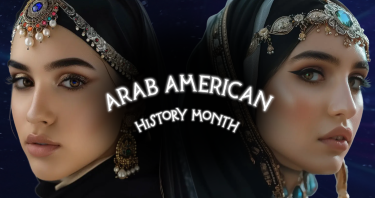“For me, this month holds profound personal significance, intertwining with the fabric of my own family history”
By: Johanna Elattar
April has arrived, and the United States is transformed into a canvas alive with the vibrant strokes of cultural celebration. Arab American History Month steps into the spotlight, beckoning for us to delve into the intricate tapestry of Arab heritage and the profound impact of Arab Americans on the nation’s story. Yet, beneath this yearly commemoration lies a compelling narrative—a story of resilience, identity, and the unwavering quest for acknowledgment.
The roots of Arab American History Month trace back to April 2017, when Michigan’s own U.S. Representative Debbie Dingell introduced a resolution to honor the contributions of Arab Americans. This pivotal resolution, embraced by the House of Representatives, aimed to shed light on the often overlooked tale of Arab Americans and their vital role in shaping American society. Thus, Arab American History Month emerged—a beacon of cultural pride and a platform for advocacy and awareness.
For me, this month holds profound personal significance, intertwining with the fabric of my own family history. My father embarked on his journey from Alexandria, Egypt, in the mid-1970s, a voyage emblematic of the enduring spirit of the Arab identity. His family’s roots, deeply embedded in the diverse landscapes of the Middle East, found comfort and belonging in Egypt—a pivotal chapter in our family’s story.
Yet, our narrative transcends borders, weaving through the tapestry of multiculturalism. My maternal lineage unfolds across Eastern Europe, Turkey, Ukraine, Italy, and France. Their migration to Egypt in the early 1900s adds layers of complexity to our cultural identity—a testament to the interconnectedness of global migration and the vibrant mosaic that is Egypt.
However, the journey to America was not without its obstacles, particularly as Muslims navigating a society rife with stereotypes and prejudices. The echoes of discrimination resonated through our experiences—encountering bullying not only from peers but also from authority figures blinded by their own biases. Yet, these challenges, though daunting, only fueled our determination to carve out a space for ourselves and our community in the American narrative
It was not easy for myself and my parents as Muslims in America. This echoes the sentiments of countless Arab Americans who have faced similar trials. The misconceptions and sensationalized narratives surrounding the Arab American community often obscure its diversity—blurring the lines between ethnicity, nationality, and religion.
This special month serves as a poignant reminder of the resilience and tenacity of Arab Americans—a celebration of cultural pride and a call to action for greater understanding and acceptance. The month-long festivities, characterized by educational initiatives, cultural events, and community gatherings, provide a platform to amplify Arab voices and narratives, challenging stereotypes and fostering dialogue.
In the annals of American history, the Arab American narrative is a chapter often overlooked, overshadowed by stereotypes and misconceptions. Yet, behind the veil of ignorance lies a story of resilience in the face of adversity and remarkable contributions to the fabric of American society.
Arab Americans have faced a myriad of challenges on their journey to assimilation and acceptance in the United States. From the early waves of immigration in the late 19th and early 20th centuries to the present day, Arab Americans have encountered discrimination, prejudice, and systemic barriers.
The post-9/11 era saw a surge in anti-Arab sentiment, with Arab Americans and those perceived to be Arab or Muslim becoming targets of suspicion and hostility. Racial profiling, surveillance, and hate crimes became all too common, casting a dark shadow over the Arab American community. Despite these hardships, Arab Americans have persevered, challenging stereotypes and advocating for their rights and dignity.
Amidst adversity, Arab Americans have made significant contributions to every facet of American life. In the realm of business, Arab American entrepreneurs have thrived, founding successful enterprises and driving innovation across industries. From retail giants to technology startups, Arab Americans have left an indelible mark on the American economy.
In politics and public service, Arab Americans have risen to prominence, breaking barriers and championing causes that resonate with their community and the nation at large. Trailblazers like Ralph Nader, the first Arab American presidential candidate, and Donna Shalala, the former Secretary of Health and Human Services, have paved the way for future generations of Arab American leaders.
In the arts and culture, Arab Americans have enriched the American tapestry with their unique perspectives and creative talents. From literature to music to film, Arab American artists have offered nuanced portrayals of identity, belonging, and the immigrant experience, challenging stereotypes and fostering empathy and understanding.
Moreover, Arab Americans have made invaluable contributions to fields such as science, medicine, and academia, pushing the boundaries of knowledge and innovation. From Nobel laureates to pioneering researchers, Arab American scientists and scholars have left an indelible mark on the quest for progress and discovery.

Johanna Elattar is a Hornell NY based writer who tackles big pictures issues like this or community based stories that have a hyper-local focus. You can contact her anytime via email: hauntedhill@yandex.com






